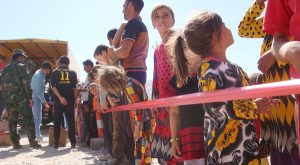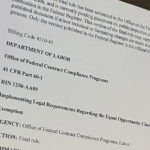Religious minorities and others fleeing persecution are among the world’s most vulnerable people, and the United States needs to reclaim its position of moral leadership in responding to refugees and asylum seekers, a panel of experts insisted.
Representatives of refugee resettlement agencies and others testified in a Feb. 10 virtual hearing before the U.S. Commission on International Religious Freedom.
Witnesses and commissioners cited the United Nations High Commissioner for Refugees report saying 1.4 million extremely vulnerable refugees around the world—many of whom fled religious persecution—urgently need to be resettled.
Religious freedom and displaced people
“At a time when 80 million people are forcibly displaced around the world—the highest number in recorded history—strong U.S. leadership is needed now more than ever to provide humanitarian assistance and protection to those who are persecuted and to promote religious freedom abroad,” said Jenny Yang, senior vice president for advocacy and policy at World Relief, the refugee resettlement and humanitarian aid agency of the National Association of Evangelicals.
 Globally, more than 340 million Christians face high levels of persecution for their faith, and religious minorities such as the Rohingya in Burma and the Uyghurs in China particularly are threatened, she noted.
Globally, more than 340 million Christians face high levels of persecution for their faith, and religious minorities such as the Rohingya in Burma and the Uyghurs in China particularly are threatened, she noted.
“The nexus between the lack of religious freedom and forced migration is undeniable,” she said.
The U.S. refugee admissions program historically received bipartisan support and has been “a lifeline of protection for those who have been fleeing religious persecution,” she noted.
Yang and several other witnesses pointed out the U.S. refugee admissions target plunged in the last few years from its historic norm of about 95,000 to 15,000—the lowest level in the history of the refugee resettlement program.
Priority given to persecuted Christians?
Although the Trump Administration prioritized Christian refugees fleeing religious persecution, the drastic reduction in the overall number of refugees admitted meant fewer refugees who fled their homelands due to religious persecution were resettled in the United States.
Sign up for our weekly edition and get all our headlines in your inbox on Thursdays

While the percentage of refugees resettled to the United States who are Christian soared from 44 percent in 2016 to 79 percent in 2019, the actual number of Christians resettled in that timeframe dropped from 37,521 to 23,754, said panelist Mark Hetfield, president and CEO of the Hebrew Immigrant Aid Society.
“This underscores that the best way to help refugees who have fled religious persecution is to help more refugees—not replace one form of discrimination with another,” Hetfield said.
In fiscal year 2020, only 2,811 Christian refugees were resettled from the 50 countries on Open Doors USA’s World Watch List of nations that are the worst in terms of religious freedom—an 83 percent decrease since fiscal year 2016, Yang reported.
The number of Jewish, Yezidi, Rohingya and Baha’i refugees showed similar precipitous decreases during that time, she continued.
“The ability of the United States to effectively promote religious freedom is directly tied to our ability to welcome and protect those who are fleeing religious persecution,” Yang said. “At a time of unprecedented forced migration, the U.S. has a moral responsibility to do as much as it can to meet the needs of our vulnerable neighbors.”
‘A good start’
She and other panelists applauded the first steps President Biden has taken to raise the refugee resettlement ceiling, but they insisted the White House and Congress must work together to restore the refugee resettlement and asylum programs.
“President Biden is off to a good start, but it is just a start,” Hetfield said.
He affirmed the executive order to expand possibilities for family reunification, as well as allowing remote videoconferencing to expand the capacity of refugee adjudication.
Hetfield noted the United States since 2001 resettled—without any known security incident—more than 33,000 Jews, Christians, Baha’i, Mandaean and other refugees from Iran with the assistance of his agency in Vienna, Austria.
“Since February 2017, presumably due to complications related to U.S. vetting procedures, this longstanding escape route has been totally shut down—not by Iran, but by the United States,” he said.
While the Biden Administration reports progress in reopening that avenue, it still remains closed at this point, Hetfield said.
Vetting process has ensured security
Immigration attorney Leon Rodriguez, the former director of U.S. Citizenship and Immigration Services at the U.S. Department of Homeland Security, emphasized vetting procedures have been successful from a national security standpoint, but they stand in need of continuing improvement.
“The vetting process has worked to prevent threats to the U.S.—not just from refugees, but also from other immigrant populations, as well,” Rodriguez said.
In the years after Sept. 11, 2001, the screening process developed into a robust and multi-layered process that relies on the best information available from national and international intelligence sources and law enforcement, he said.
For example, tens of thousands of refugees from Syria and Iraq were admitted into the United States between 2014 and 2017, and not a single one has engaged or attempted to engage in any act of terrorist violence in the country, he said.
Rodriguez, the Jewish son of Cuban refugees, asserted the United States not only has an obligation on humanitarian and moral grounds to welcome individuals fleeing religious persecution, but also as a matter of global security.
“It is a critical element of how the United States is seen around the world,” he said.
‘We have to move faster’
Elizabeth Neumann, senior adviser with the National Immigration Forum and former assistant secretary for threat prevention and security in the U.S. Department of Homeland Security, echoed that same theme.
“Over the last four years, the United States has acted against its own national security interests and retreated from the growing refugee challenge with policies rooted in xenophobia and discrimination,” Neumann said.
About 85 percent of the 80 million forcibly displaced people in the world—many of whom are fleeing religious persecution—are hosted in developing regions as defined by the United States, she said. She added 27 percent are in least developed countries—regions that face significant economic challenges and areas where terrorist movements often are present.
“In such economic and politically unstable environments, forcibly displaced individuals are vulnerable prey to ideological extremism and abusive exploitation,” Neumann said.
To protect national security, the United States not only should conduct efficient security vetting, but also expediently resettle refugees into a safe environment, she explained.
“Despite recent rhetoric, refugees are the most thoroughly vetted individuals who come to the United States, but we have to move faster,” Neumann said. “The sometimes decade-long wait for resettlement is not only inhumane, but also increases an individual’s susceptibility of being radicalized.”
She voiced support for the Biden administration’s efforts to raise the refugee resettlement ceiling and modernize the refugee admissions program, as well as its stated intent to address root causes that lead to displacement.
‘Broken’ people enduring ‘unimaginable suffering’
Murad Ismael, co-founder and former executive director of Yazda, a global Yazidi organization, specifically addressed the plight of his people.

Six and a half years after the beginning of the Yazidi genocide, 65 percent of the population of the Sinjar district in northern Iraq remains displaced, with about 210,000 in refugee camps in Kurdistan, he reported. About 70,000 have migrated from Iraq, mostly to Europe.
“The Yazidi community continues to endure unimaginable suffering,” Ismael said.
Those who remained in Sinjar or returned there lack basic services and job opportunities, he noted.
They also continue to feel the effects of trauma, he said, pointing to rising incidents of suicide. Yazidis—and other religious minorities—“are broken” and need trauma-informed psychological and social support, he insisted.
He asked that the United States accept 25,000 Yazidi refugees for resettlement.
“The Yazidi community is one of the ancient religious minorities in the Middle East, a community that suffered killing, enslavement, displacement, abuse and torture—for no reason of their own but for who they are,” Ismael said.














We seek to connect God’s story and God’s people around the world. To learn more about God’s story, click here.
Send comments and feedback to Eric Black, our editor. For comments to be published, please specify “letter to the editor.” Maximum length for publication is 300 words.